N/R: Community Nutritionist advises public to go for regular check-ups
A community Nutritionist in Tamale Mary Ann Tanlongo has advised the public to go for regular medical check-ups to reduce risk of diabetes infections. She said it is important for everyone to check his or her health condition regularly to detect potential life threatening diseases early. Ms Mary Ann was speaking in an interview on Zaa major news.
She said prevention of diseases was important in reducing the number of patients requiring medical treatment and advised members of the public to maintain healthy diet, healthy weight and increase the level of physical activity to enhance their health status. Ghana recently joined the world to mark World Diabetes Day (WDD). On November 14 each year, the international community commemorates WDD to raise awareness on the growing burden of diabetes and strategies to prevent and treat it.
The theme for this year, and until 2023, is, “Access to diabetes care”. The World Health Organization (WHO) has however asked governments to make essential products like insulin, blood glucometers and test strips available to all communities. This it said should also be backed by training of health workers in non-communicable disease prevention and management at the district and community level towards improving service availability.
Ms Mary Ann noted that the cause of diabetes depends on your genes, family history, ethnic background, and other factors such as the environment and your health, adding that complicated diabetes can lead to an eye disease called diabetic retinopathy which can affect the eyesight, damage blood vessels which can sometimes lead to heart attacks and strokes.
She said some people with diabetes may develop nerve damage caused over time by high blood sugar levels. This can make it harder for the nerves to carry messages between the brain and every part of our body so it can affect how we see, hear, feel and move.
Some symptoms of diabetes she mentioned include increased hunger, increased thirst, weight loss, frequent urination, blurry vision, extreme fatigue, and sores that don’t heal.
She said many other diabetes risk factors are controllable saying most diabetes prevention strategies involve making simple adjustments to your diet and fitness routine.
‘’I think it is important that people take their health seriously by going for regular medical examination, consult a nutritionist or dietician to know what goes inside their body system’’, she added.
Prevalence
Globally, the prevalence of diabetes has escalated comprehensively, with recent estimates of over 422 million adults aged 18 years and older, and an estimated attributable death rate of 1.5 million per year. Diabetes is projected to be the seventh leading cause of death by the year 2030, with the numbers expected to increase to over 600 million by the year 2030.
More than two-thirds of the rise in the prevalence of diabetes is expected in low- and middle-income countries, including those in sub-Saharan Africa. Trends in the prevalence of diabetes in Ghana do not differ significantly from those observed in other sub-Saharan African countries, with earlier studies showing a meager prevalence rate of less than 0.02% of the adult population and recent figures ranging from 6.2% to 13.9%.5–8. These figures may not be alarming, as a sizeable proportion of individuals are left undiagnosed in the adult population.
By Lilian D. Walter/zaanews.com/Ghana


